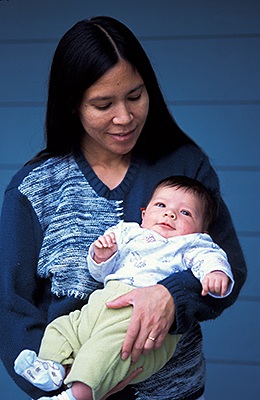Are the Effects of Obesity Generational?

Findings by ARS scientists may underscore the need for aspiring moms to achieve a healthy weight before becoming pregnant and to gain only the recommended amount of weight during pregnancy. (Photo by Peggy Greb)
Doctors have warned for decades that obesity can lead to many serious health conditions for both children and adults. Now, research conducted by the Agricultural Research Service (ARS) suggests obesity in women may affect the health of children even prior to conception.
“Pregnancy is a critical period when life-long risk of chronic diseases for the child is impacted,” said Meghan Ruebel, biologist at the Microbiome and Metabolism Research Unit (MMRU), which is co-located at Arkansas Children’s Nutrition Center (ACNC) in Little Rock, AR. “It is well established that obesity during pregnancy increases the chances of obesity in the child and is frequently associated with increased signs of inflammation in the placenta and oocyte.”
The placenta is a temporary organ that develops in the uterus during pregnancy and provides oxygen and nutrients to the baby through the umbilical cord. An oocyte is a developing egg, that will be fertilized to become an embryo, a fetus, and later a newborn.
The research team and some of Ruebel’s predoctoral work with Aline Andres, associate director of ACNC, examined specific immune related proteins and receptors within the placenta and obesity. They found that women with obesity who underwent in vitro fertilization had increased pro-inflammatory genes in oocytes compared to women that had a normal weight body mass index, suggesting that obesity can have an impact as early as the pre-conception period.
In follow up animal studies, researchers from ACNC and MMRU found that mice fed high-fat diets had adverse effects in the placentas of male offspring, especially if a key protein receptor (TLR/MyD88) was absent. Test results in mice often directly correlate with results in humans.
“These findings provide unique evidence that placental changes due to maternal obesity are related to offspring obesity risk and liver health,” Ruebel said. “Pregnancy is [the] ideal window for researchers to intervene and stop rising obesity rates in the United States. [Being] overweight predisposes babies to obesity, cardiovascular diseases, type 2 diabetes, impaired cognition, and allergies.”
Ruebel noted that results of the study also suggest that more research is warranted, specifically for some of the physiological changes in mothers that occur due to obesity during the prenatal period.
“Little information is available on the impact of being overweight before pregnancy on immune cell gene expression during pregnancy,” said Laxmi Yeruva, MMRU research leader. “The research team leveraged a clinical study from ACNC [and found that] being overweight influences the immune cell genes in each trimester of pregnancy. It also provided a snapshot of complex interconnections between maternal gene expression, gut microbiota (microorganisms present in the gastrointestinal tract), dietary components, milk components, and infant fecal microbiota. Further understanding of this association may aid in developing powerful strategies against obesity-mediated effects.”
Knowledge gained from these projects may help mitigate the development of chronic disease. – by Scott Elliott, ARS Office of Communications

